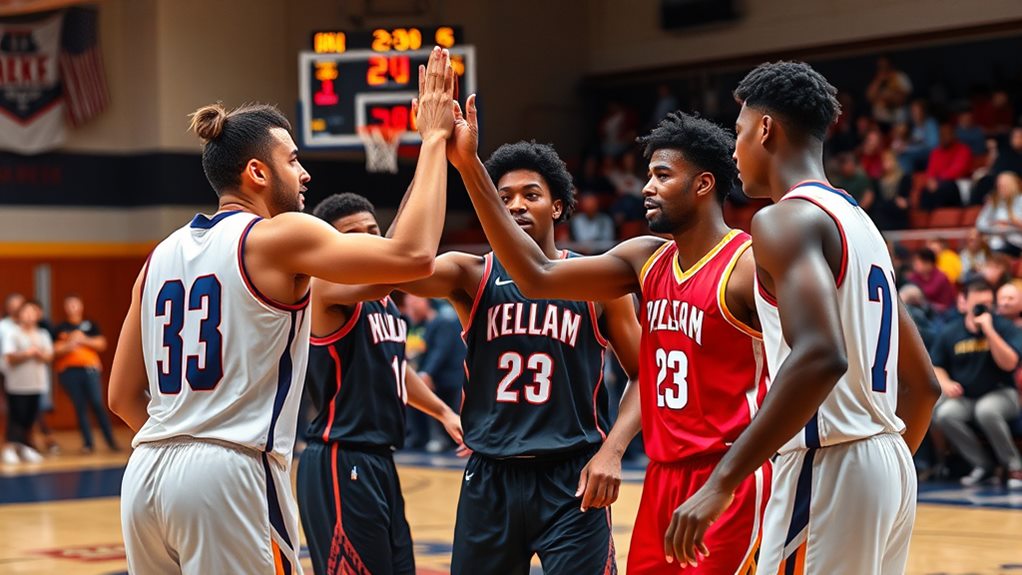
What Makes a Good Teammate in Basketball? Key Traits
November 23, 2024A good teammate in basketball stands out through key traits that enhance team dynamics. You should focus on building real relationships, fostering trust, and promoting team unity. Embrace different roles and commit to maximum effort, showing dedication to both personal and team improvement. Keeping a positive attitude helps uplift others and promotes resilience amidst challenges. Effective communication is essential, ensuring everyone feels valued and understood. Take accountability for your actions, and create a supportive environment where teammates thrive. There's much more to explore about these traits and their impact on the game.
Developing Real Relationships
Developing real relationships among teammates is key to building a successful basketball team. When you take the time to understand your teammates' backgrounds and personal stories, you lay the groundwork for trust and camaraderie that extends beyond the court. This creates a supportive environment where everyone feels valued and connected.
Engaging in social events and shared experiences can greatly enhance team chemistry, similar to how soccer moves require teamwork and coordination. By encouraging shy teammates to participate, you promote unity that translates into better on-court performance. Remember, consistent actions and transparent communication are essential for fostering trust; they guarantee that everyone is on the same page and feels secure in their roles.
Celebrating both individual and team successes plays an important role in cultivating a positive atmosphere. When you recognize and support each other's achievements, you reinforce the bonds within the team and enhance mutual support. This unity not only boosts morale but also makes everyone more resilient during challenging games and situations.
Ultimately, by prioritizing these relationships, you create a foundation that allows your team to thrive both on and off the court.
Team Unity and Bonding
Team unity and bonding are essential for creating a cohesive basketball squad. When you invest time in social events, you provide opportunities for bonding that help shy teammates engage. This fosters camaraderie, creating a more inclusive environment where everyone feels valued.
Engaging with families and supporters can also enhance team spirit and connection among players, as seen in the way soccer fans strengthen community bonds through shared experiences shared experiences in soccer. Avoiding cliques is imperative; it promotes inclusivity and strengthens overall team unity, allowing players to connect on a deeper level.
Shared experiences, such as team celebrations and rituals, greatly enhance team chemistry. These moments create lasting memories that bind teammates together, making your squad stronger. When you celebrate individual successes collectively, you foster a positive atmosphere, reinforcing mutual respect and support among players.
Moreover, forming deep relationships off the court is essential. By understanding each other's backgrounds and interests, you lay the groundwork for stronger on-court performance and trust.
A team that knows each other well is more likely to communicate effectively during games, leading to better teamwork.
Embracing Different Roles
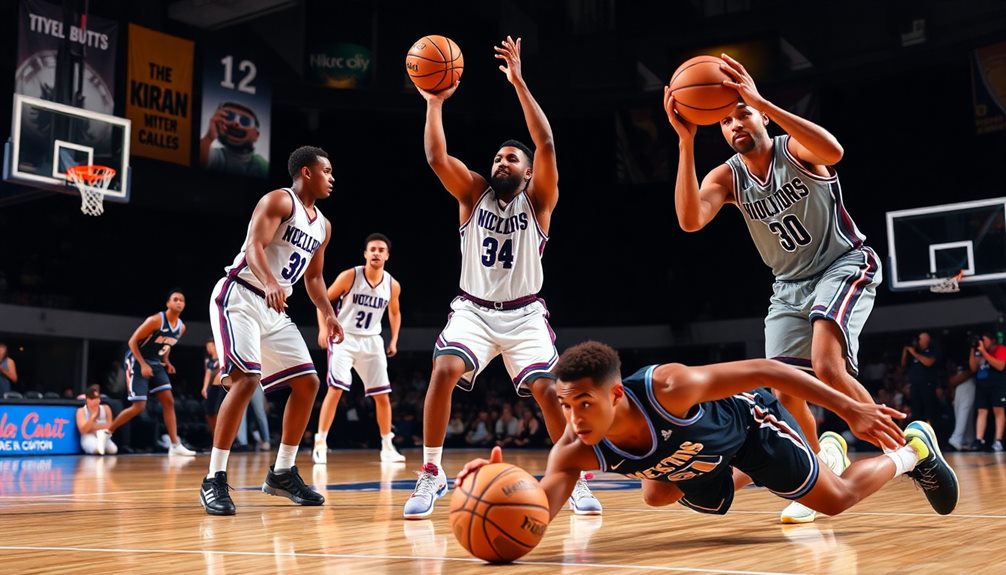
Embracing different roles is essential for your team's success, as it shows you prioritize collective goals over personal glory.
By adapting to various responsibilities, whether as a scorer or defender, you contribute to a more versatile team.
Mastering defensive techniques, such as maintaining a strong defensive stance or executing slide tackles, allows you to support your teammates effectively to enhance your defensive skills.
Your selflessness and willingness to sacrifice for others create a strong foundation for unity and collaboration.
Team-First Mindset
Often, a team-first mindset is vital for success in basketball, as it emphasizes collective achievement over personal glory. When you adopt a team-first attitude, you prioritize the team's goals above your own aspirations. This selflessness fosters a culture where great teammates hold themselves accountable and willingly embrace their roles, no matter how big or small.
Being part of a team often requires you to sacrifice personal desires, whether that means accepting reduced playing time or taking on specialized responsibilities. This commitment strengthens trust among teammates and reinforces the importance of collaboration. When everyone is focused on the same objectives, the entire team benefits.
Moreover, great teammates understand that effective communication and support are essential. They actively engage with one another, ensuring that each player feels valued and involved. By encouraging open dialogue, you create an environment where everyone can thrive.
Role Adaptability
In basketball, a good teammate knows that role adaptability is crucial for the team's success. Players must be willing to accept changes in their responsibilities, whether it's shifting from a starting position to a bench role or adjusting their gameplay based on the team's needs. Embracing different roles helps teammates better understand the specific contributions they can make, whether that's scoring, playmaking, or defensive assignments. This flexibility allows you to adjust strategies during games, taking advantage of opponents' strengths or weaknesses.
When you prioritize a team-first approach, you create an environment where selflessness thrives. Adaptable teammates are those who willingly sacrifice personal statistics or playing time for the betterment of the team. This kind of mindset fosters unity and builds strong team dynamics.
Active communication is essential. By discussing role expectations openly, you enhance clarity and collaboration, boosting team cohesion and effectiveness on the court.
Selflessness and Sacrifice
Selflessness and sacrifice are at the heart of effective teamwork in basketball. When you prioritize the team's success over personal accolades, you embrace a team-first attitude that fosters unity and collaboration. This mindset encourages you to make the extra pass for a better shot or dive for loose balls, markedly enhancing overall team dynamics.
Embracing different roles is vital, too. Sometimes, you might need to accept reduced playing time or shift positions to meet the team's needs. Your adaptability showcases your commitment to the group, demonstrating that you're willing to do whatever it takes for the greater good.
When you sacrifice personal desires, like individual stats, for the benefit of your teammates, you help create a supportive and cohesive environment. Celebrating the successes of others not only reinforces a culture of selflessness but also boosts team morale and chemistry.
By recognizing and acknowledging each contribution, you strengthen the bonds within the team, making everyone feel valued.
In basketball, being a good teammate means embodying selflessness and sacrifice, ensuring that together, you can achieve more than any individual ever could.
Consistent Maximum Effort
When you put in consistent maximum effort, you set a powerful example for your teammates, encouraging them to raise their game too.
Your commitment to giving your all, no matter the situation, can greatly boost team spirit, especially during tough times.
This relentless effort not only enhances individual performance but also fosters an environment where teamwork flourishes, essential for building a full endurance team.
Control of Effort
Consistent maximum effort is essential in basketball, as it sets the tone for the entire team's performance. When you control your effort, you create a standard that encourages your teammates to commit fully as well.
Players who consistently show relentless effort, no matter the game situation, inspire everyone around them to elevate their performance and contribute to the team's success.
Your ability to maintain high levels of effort is especially crucial during challenging moments, whether in games or practice. This control over your effort fosters a culture of hard work and dedication, which is contagious.
When you demonstrate maximum effort, you not only improve your own skills but also signal your commitment to the team's goals.
Inspiring Teammates Daily
Embodying maximum effort on a daily basis not only elevates your own game but also inspires those around you. When you consistently put in the effort, your teammates notice. This creates a culture of hard work that encourages everyone to step up their game. It's not just about skill—it's about demonstrating the relentless drive to work hard, regardless of the situation.
Your unwavering dedication in practices sets a standard for your teammates to follow. They see your commitment and are motivated to match it, fostering a competitive environment that benefits the entire team. When you control your effort and show that you're willing to go the extra mile, you help transform the team's dynamics.
This positive atmosphere boosts morale and inspires those around you to push their limits. By embodying maximum effort, you contribute to overall team success. Remember, basketball is a collective effort, and your determination can ignite a fire in your teammates.
Impact on Team Spirit
Maximum effort from each player plays a pivotal role in shaping team spirit. When you consistently give 100% effort, you set a standard that inspires your teammates to elevate their own performance. This commitment creates a culture where the team comes first, and everyone understands the importance of hard work.
Your great attitude during practices and games contributes greatly to a positive team atmosphere. It's contagious; when you show up ready to battle, your teammates feel motivated to push their limits alongside you. This relentless effort fosters accountability, as players hold each other to high expectations.
Moreover, by maintaining high effort levels, especially in challenging moments, you help boost team morale and resilience. Your determination not only enhances your individual skills but also strengthens the bond among teammates, creating a unified front.
In the end, your consistent maximum effort is a cornerstone for the team's success, making everyone feel valued and driven.
Commitment to Improvement
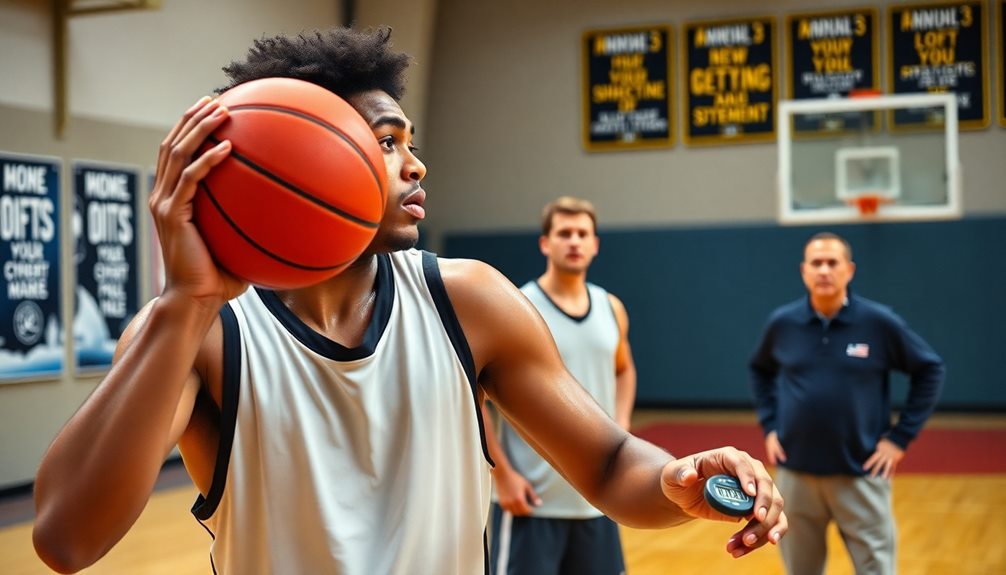
A commitment to improvement is fundamental for any basketball player who wants to excel both individually and as part of a team. When players hold themselves accountable for their growth, they set a standard that benefits everyone. This dedication means consistently putting in the work during practice and games, as well as outside of scheduled team sessions.
By working hard on skill enhancement activities like drills and conditioning, you not only elevate your own performance but also help the team thrive. Engaging in regular training and practice is essential for developing a strong foundation and improving overall skills.
Regularly evaluating your progress towards both individual and team goals shows a strong commitment to improvement. It fosters a culture of continuous development, where everyone is encouraged to grow together.
Being open to feedback from coaches and teammates is critical, as it cultivates trust and accountability within the group. When you prioritize your own development, you positively impact the overall performance and chemistry on the court.
In essence, a commitment to improvement not only enhances your skills but also reinforces the team's unity and success. By investing in yourself, you guarantee that you're doing your part to help the team reach its full potential.
Maintaining a Positive Attitude
In basketball, a positive attitude can be the glue that holds a team together, especially during tough times. When you maintain optimism, you help create a supportive environment that uplifts team morale.
This resilience is essential for overcoming challenges and encourages everyone to push forward. As in soccer, where inspirational quotes elevate teams to new heights, your attitude can notably influence your teammates, fostering a sense of belonging and unity that's vital for effective teamwork.
Here are some ways to maintain a positive attitude:
- Celebrate your teammates' successes to reinforce camaraderie.
- Offer encouragement during tough moments to boost morale.
- Keep a cheerful demeanor, motivating others to stay committed.
- Share appreciation for hard work, promoting a supportive atmosphere.
- Focus on collective goals to align efforts and strengthen bonds.
Effective Communication Skills
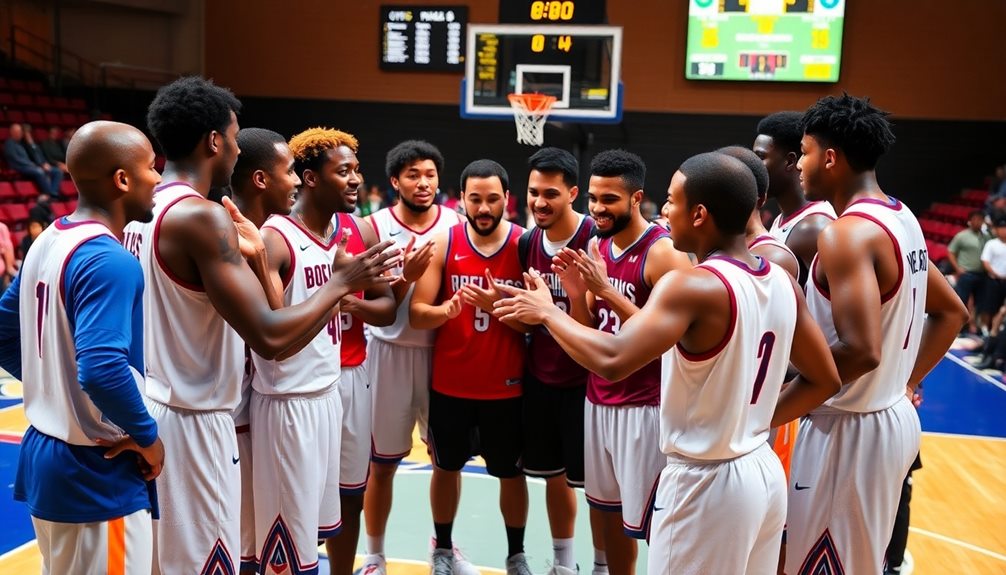
Mastering effective communication skills is essential for success on the basketball court. When you and your teammates can clearly convey thoughts and strategies, it prevents misunderstandings and keeps everyone on the same page. This collaborative environment is critical, especially in a sport that benefits from increased diversity in athletic representation, as players from various backgrounds bring unique perspectives and playing styles.
Active listening plays a key role in this process; it fosters collaboration and helps build respect among teammates. By genuinely hearing each other, you create an open dialogue that enhances team chemistry.
Regular check-ins and team meetings can greatly improve your communication strategies. These sessions allow players to address concerns and provide feedback, ensuring that everyone feels valued.
Furthermore, non-verbal communication, like eye contact and hand signals, can elevate team coordination, especially in high-pressure situations when quick, silent cues are essential.
Look to strong communicators on your team, like vocal leaders who can anchor the defense or direct offensive plays. Their ability to articulate thoughts not only elevates their performance but also boosts the overall effectiveness of the team.
Accountability and Responsibility
Embracing accountability and responsibility is essential for building a successful basketball team. When you and your teammates hold each other accountable, it fosters trust and reliability, which are vital for team dynamics.
By committing to your obligations, like attending practices and participating in film sessions, you show dedication to the team's success, similar to how global basketball expansion relies on cooperation and commitment from all players. This commitment enhances overall performance and creates a culture focused on improvement.
Here are some key aspects of accountability and responsibility in basketball:
- Acknowledge Mistakes: Openly recognizing errors helps the team learn and grow together.
- Engage in Conversations: Discussing performance and expectations allows for constructive feedback and clarity in roles.
- Commit to Team Obligations: Regular attendance at practices strengthens team cohesion and preparedness.
- Support Each Other: Encouraging teammates fosters an environment where everyone feels valued and responsible.
- Recognize Collective Impact: Understanding your role's influence on team dynamics cultivates a sense of unity.
Supportive Team Environment
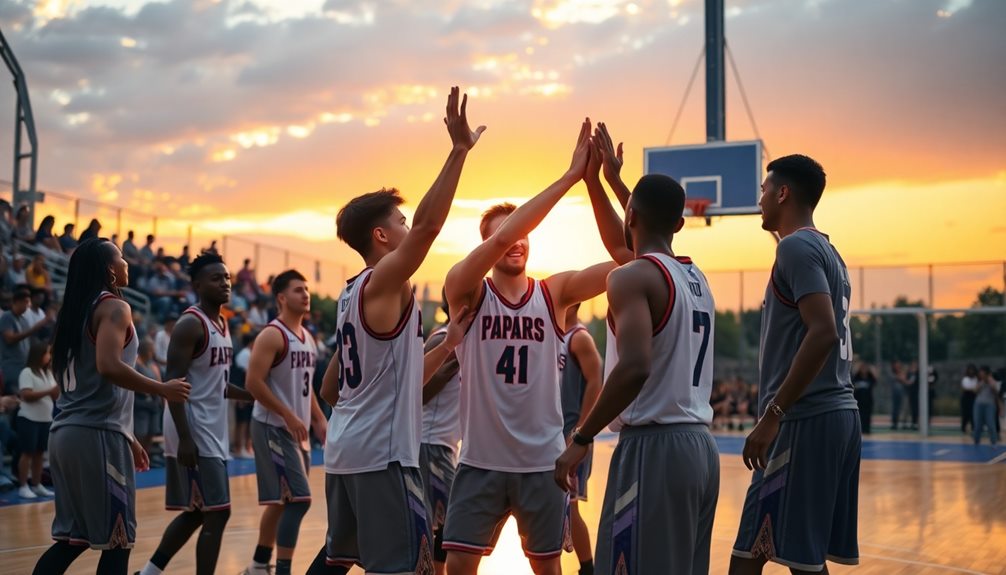
Building on a foundation of accountability and responsibility, a supportive team environment plays a vital role in enhancing team performance. It fosters camaraderie, which boosts overall team chemistry and makes you more effective on the court. When you provide encouragement during tough times, like after a missed shot or a lost game, you greatly uplift a teammate's confidence and morale.
Incorporating elements of quality training sessions into your practice can also reinforce this support, as teammates work together to improve their skills and techniques.
Celebrating each other's successes, no matter how small, reinforces a culture of support and recognition. This creates a positive atmosphere where everyone feels valued and motivated to contribute. When you help teammates in challenging situations, you demonstrate your commitment to collective goals, strengthening bonds within the group.
In this supportive team environment, resilience grows. You're more likely to overcome adversity during games when you know your teammates have your back.
This positive dynamic not only enhances individual performance but also elevates the team's overall effectiveness. Remember, a supportive environment isn't just about avoiding negativity; it's about actively lifting each other up, creating a space where everyone can thrive together.
Conclusion
In basketball, becoming a brilliant teammate boils down to building bonds, boosting belief, and embracing every effort. By committing to constant improvement and cultivating camaraderie, you create a supportive squad that thrives. Keeping a positive perspective and communicating clearly not only enhances play but also fosters friendships. Remember, accountability is key; when you own your actions, the whole team benefits. So, dig deep, support your squad, and together you'll achieve greatness on and off the court!


